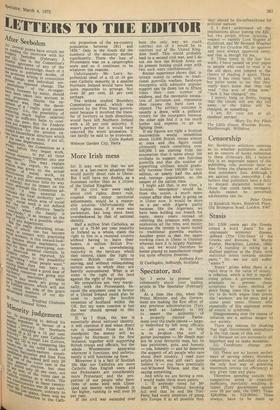More Irish mess
Sir: It may well be that we are now in a last-resort situation that would justify direct rule in Ulster. But I still have my doubts, as a Scotsman rather than as a citizen of the United Kingdom. If the civil war were really about civil rights, direct rule, coupled with minor territorial adjustments, would be a reasonable solution. Unfortunately the civil rights issue, if it ever was paramount, has long since been overshadowed by that of national identity.
Half a million Irish Catholics, as part of a 75-80 per cent majority in Ireland as a whole, claim the right to live in a reunited country without having to leave their homes. A million British Protestants, or an overwhelming majority in the territory which they control, claim the right to remain British, also without moving, and without relinquishing certain areas in which they are heavily outnumbered. What is at stake is the right of the land against the right of the people. My sympathies are, very marginally, with the Protestants, because the argument used in favour of a United Ireland could also be used to justify the forcible retention of Scotland within the UK. But my main concern is lest the war should spread to this country.
If, as I think, the war is essentially about national identity, it will continue if and when direct rule is imposed. From an IRA standpoint the enemy will no longer be Stormont in the first instance, together with supporting British troops and officials, but the whole Westminster apparatus wherever it functions, and unfortunately it still functions up here.
Moreover it is a fact of Scottish life that our Catholics are more Catholic than English ones, and our Protestants are considerably more Protestant; and the proportion of our people who have links of some kind with Ulster (and not merely with Ireland) is far higher, running to well over 30 per cent. If the civil war extended over here the only way we could contract out of it would be to contract out of the United Kingdom itself. This would probably lead to a second civil war, and I do not see how the British Army on its present footing could cope with two such wars similteneously.
Recent experience shows that, in terrain suited to urban or traditional guerrilla warfare, hard-core insurgents with adequate popular support can tie down ten to fifteen times their own number of soldiers, and the inevitable escalation of terrorism and repression then causes the hard core to expand. The military outcome is usually a draw, with a political victory for the insurgents because the other side find it is too much bother and expense to go on fighting them. If my figures are right a Scottish insurrection would immobilise about 15,000 British troops almost at once and this figure could ultimately reach something over 300,000. I am starting from the assumption that it takes about 100 civilians to support one full-time guerrilla and that the number of supporting civilians would gradually increase from 100,000 to two million, or nearly half the adult and teenage population, as the temper of the nation rises. I might add that, in my view, a Scottish 'emergency' would be, from the outset, a much more violent affair than what is going on in Ulster now. It would be more on a par with Algeria partly because, like the Algerians, we have been holding our breath for many, many years instead of relieving the pressure with minor explosions all the time, and mainly because the terrain is more suited to traditional guerrilla warfare. Another point is that the upper working class in Ulster is Unionist whereas here it is largely Nationalist, and we would therefore be better placed to manufacture rough but quite effective firearms. Anthony Kerr 52 Castlegate, Jedburgh, Scotland










































 Previous page
Previous page